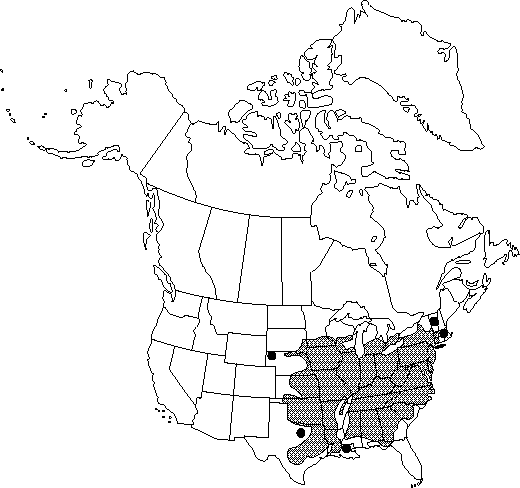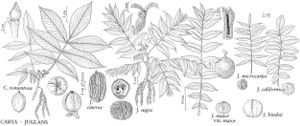Difference between revisions of "Juglans nigra"
Sp. Pl. 2: 997. 1753.
FNA>Volume Importer |
imported>Volume Importer |
||
| (7 intermediate revisions by 2 users not shown) | |||
| Line 13: | Line 13: | ||
}}{{Treatment/ID/Special_status | }}{{Treatment/ID/Special_status | ||
|code=F | |code=F | ||
| − | |label= | + | |label=Illustrated |
}} | }} | ||
|basionyms= | |basionyms= | ||
| Line 19: | Line 19: | ||
|name=Wallia nigra | |name=Wallia nigra | ||
|authority=(Linnaeus) Alefeld | |authority=(Linnaeus) Alefeld | ||
| + | |rank=species | ||
}} | }} | ||
|hierarchy=Juglandaceae;Juglans;Juglans nigra | |hierarchy=Juglandaceae;Juglans;Juglans nigra | ||
| Line 27: | Line 28: | ||
}}<!-- | }}<!-- | ||
| − | --><span class="statement" id="st- | + | --><span class="statement" id="st-undefined" data-properties=""><b>Trees,</b> to 40(-50) m. <b>Bark</b> medium to dark gray or brownish, deeply split into narrow rough ridges. <b>Twigs</b> with distal edge of leaf scar notched, usually deeply, not bordered by well-defined band of pubescence; pith light brown. <b>Terminal</b> buds ovoid or subglobose, weakly flattened, 8-10 mm. <b>Leaves</b> 20-60 cm; petiole 6.5-14 cm. <b>Leaflets</b> (9-)15-19(-23), lanceolate or ovate-lanceolate, symmetric or weakly falcate, (3-)6-15 × 1.5-5.5 cm, margins serrate, apex acuminate; surfaces abaxially with capitate-glandular hairs, simple or 2-rayed fasciculate hairs, and scales scattered over veins and blade, axils of proximal veins with prominent tufts of fasciculate hairs, adaxially glabrous except for scattered capitate-glandular and fasciculate hairs on midrib; terminal leaflet small or often absent. <b>Staminate</b> catkins 5-10 cm; stamens 17-50 per flower; pollen sacs 0.8-0.9 mm. <b>Fruits</b> 1-2, subglobose to globose, rarely ellipsoid, 3.5-8 cm, warty, with scales and capitate-glandular hairs; nuts subglobose to globose, rarely ellipsoid, 3-4 cm, very deeply longitudinally grooved, surface between grooves coarsely warty. <b>2n</b> = 32.</span><!-- |
-->{{Treatment/Body | -->{{Treatment/Body | ||
| Line 34: | Line 35: | ||
|elevation=0-1000 m | |elevation=0-1000 m | ||
|distribution=Ont.;Ala.;Ark.;Conn.;Del.;D.C.;Fla.;Ga.;Ill.;Ind.;Iowa;Kans.;Ky.;La.;Md.;Mass.;Mich.;Minn.;Miss.;Mo.;Nebr.;N.J.;N.Y.;N.C.;Ohio;Okla.;Pa.;R.I.;S.C.;S.Dak.;Tenn.;Tex.;Vt.;Va.;W.Va.;Wis. | |distribution=Ont.;Ala.;Ark.;Conn.;Del.;D.C.;Fla.;Ga.;Ill.;Ind.;Iowa;Kans.;Ky.;La.;Md.;Mass.;Mich.;Minn.;Miss.;Mo.;Nebr.;N.J.;N.Y.;N.C.;Ohio;Okla.;Pa.;R.I.;S.C.;S.Dak.;Tenn.;Tex.;Vt.;Va.;W.Va.;Wis. | ||
| − | |discussion=<p>Variation of Juglans nigra in central Texas and south-central Oklahoma should be studied; specimens seemingly intermediate between J. nigra and both J. major and J. microcarpa have been seen from this area. E. C. Twisselman (1967) incorrectly reported that J. nigra was locally naturalized in California; his specimens were all J. hindsii (possibly introgressed with J. nigra) and J. californica.</p><!-- | + | |discussion=<p>Variation of <i>Juglans nigra</i> in central Texas and south-central Oklahoma should be studied; specimens seemingly intermediate between <i>J. nigra</i> and both <i>J. major</i> and <i>J. microcarpa</i> have been seen from this area. E. C. Twisselman (1967) incorrectly reported that <i>J. nigra</i> was locally naturalized in California; his specimens were all <i>J. hindsii</i> (possibly introgressed with <i>J. nigra</i>) and <i>J. californica</i>.</p><!-- |
| − | --><p>Juglans nigra is frequently cultivated as an ornamental, and the nuts are prized for their strong, distinctive flavor.</p><!-- | + | --><p><i>Juglans nigra</i> is frequently cultivated as an ornamental, and the nuts are prized for their strong, distinctive flavor.</p><!-- |
| − | --><p>Native Americans used Juglans nigra medicinally as a miscellaneous disease remedy, a dermatological aid, and a psychological aid (D. E. Moerman 1986).</p> | + | --><p>Native Americans used <i>Juglans nigra</i> medicinally as a miscellaneous disease remedy, a dermatological aid, and a psychological aid (D. E. Moerman 1986).</p> |
|tables= | |tables= | ||
|references= | |references= | ||
| Line 45: | Line 46: | ||
-->{{#Taxon: | -->{{#Taxon: | ||
name=Juglans nigra | name=Juglans nigra | ||
| − | |||
|authority=Linnaeus | |authority=Linnaeus | ||
|rank=species | |rank=species | ||
| Line 59: | Line 59: | ||
|publication title=Sp. Pl. | |publication title=Sp. Pl. | ||
|publication year=1753 | |publication year=1753 | ||
| − | |special status=Endemic; | + | |special status=Endemic;Illustrated |
| − | |source xml=https:// | + | |source xml=https://bitbucket.org/aafc-mbb/fna-data-curation/src/2e0870ddd59836b60bcf96646a41e87ea5a5943a/coarse_grained_fna_xml/V3/V3_491.xml |
|genus=Juglans | |genus=Juglans | ||
|species=Juglans nigra | |species=Juglans nigra | ||
| − | |||
| − | |||
| − | |||
| − | |||
| − | |||
| − | |||
| − | |||
| − | |||
| − | |||
| − | |||
| − | |||
| − | |||
| − | |||
| − | |||
| − | |||
| − | |||
| − | |||
| − | |||
| − | |||
| − | |||
| − | |||
| − | |||
| − | |||
| − | |||
| − | |||
| − | |||
| − | |||
| − | |||
| − | |||
| − | |||
| − | |||
| − | |||
| − | |||
| − | |||
| − | |||
| − | |||
| − | |||
| − | |||
| − | |||
| − | |||
| − | |||
| − | |||
| − | |||
| − | |||
}}<!-- | }}<!-- | ||
-->[[Category:Treatment]][[Category:Juglans]] | -->[[Category:Treatment]][[Category:Juglans]] | ||
Latest revision as of 22:49, 5 November 2020
Trees, to 40(-50) m. Bark medium to dark gray or brownish, deeply split into narrow rough ridges. Twigs with distal edge of leaf scar notched, usually deeply, not bordered by well-defined band of pubescence; pith light brown. Terminal buds ovoid or subglobose, weakly flattened, 8-10 mm. Leaves 20-60 cm; petiole 6.5-14 cm. Leaflets (9-)15-19(-23), lanceolate or ovate-lanceolate, symmetric or weakly falcate, (3-)6-15 × 1.5-5.5 cm, margins serrate, apex acuminate; surfaces abaxially with capitate-glandular hairs, simple or 2-rayed fasciculate hairs, and scales scattered over veins and blade, axils of proximal veins with prominent tufts of fasciculate hairs, adaxially glabrous except for scattered capitate-glandular and fasciculate hairs on midrib; terminal leaflet small or often absent. Staminate catkins 5-10 cm; stamens 17-50 per flower; pollen sacs 0.8-0.9 mm. Fruits 1-2, subglobose to globose, rarely ellipsoid, 3.5-8 cm, warty, with scales and capitate-glandular hairs; nuts subglobose to globose, rarely ellipsoid, 3-4 cm, very deeply longitudinally grooved, surface between grooves coarsely warty. 2n = 32.
Phenology: Flowering spring (Apr–May).
Habitat: Rich woods
Elevation: 0-1000 m
Distribution

Ont., Ala., Ark., Conn., Del., D.C., Fla., Ga., Ill., Ind., Iowa, Kans., Ky., La., Md., Mass., Mich., Minn., Miss., Mo., Nebr., N.J., N.Y., N.C., Ohio, Okla., Pa., R.I., S.C., S.Dak., Tenn., Tex., Vt., Va., W.Va., Wis.
Discussion
Variation of Juglans nigra in central Texas and south-central Oklahoma should be studied; specimens seemingly intermediate between J. nigra and both J. major and J. microcarpa have been seen from this area. E. C. Twisselman (1967) incorrectly reported that J. nigra was locally naturalized in California; his specimens were all J. hindsii (possibly introgressed with J. nigra) and J. californica.
Juglans nigra is frequently cultivated as an ornamental, and the nuts are prized for their strong, distinctive flavor.
Native Americans used Juglans nigra medicinally as a miscellaneous disease remedy, a dermatological aid, and a psychological aid (D. E. Moerman 1986).
Selected References
None.
